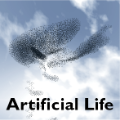There is no agreed definition of intelligence, so it is problematic to simply ask whether brains, swarms, computers, or other systems are intelligent or not. To compare the potential intelligence exhibited by different cognitive systems, I use the common approach used by artificial intelligence and artificial life: Instead of studying the substrate of systems, let us focus on their organization. This organization can be measured with information. Thus, I apply an informationist epistemology to describe cognitive systems, including brains and computers. This allows me to frame the usefulness and limitations of the brain-computer analogy in different contexts. I also use this perspective to discuss the evolution and ecology of intelligence.
翻译:没有关于情报的一致定义,因此,简单问一下大脑、群、计算机或其他系统是否智能是成问题的。为了比较不同的认知系统所显示的潜在情报,我采用了人工智能和人工生命所使用的共同方法:我们不要研究系统的基础,而要关注它们的组织。这个组织可以用信息来衡量。因此,我用信息学的认知学来描述认知系统,包括大脑和计算机。这样,我就可以在不同情况下界定大脑计算机类比的效用和局限性。我还利用这个角度来讨论情报的演变和生态。





